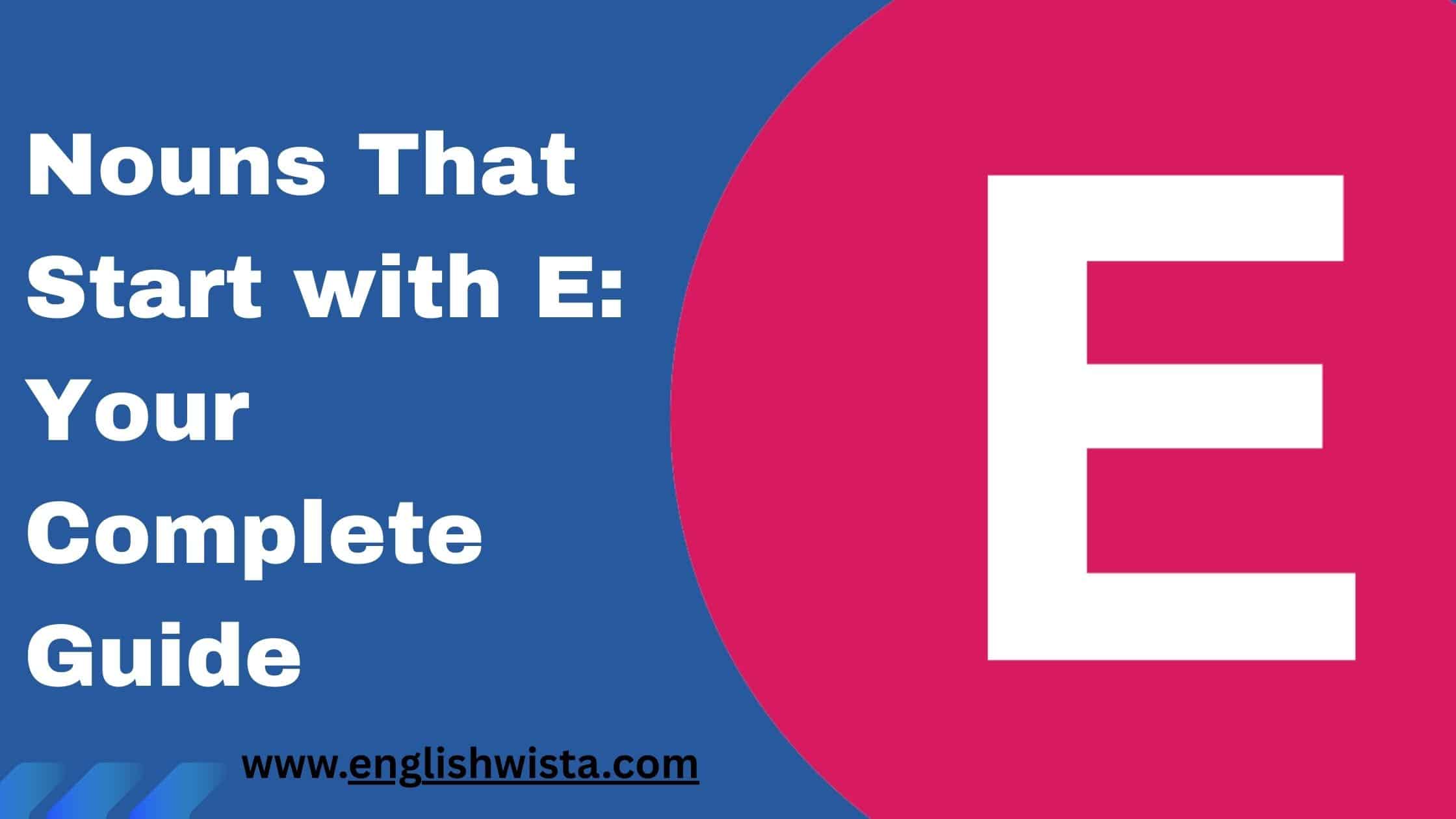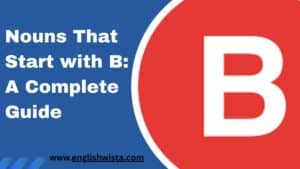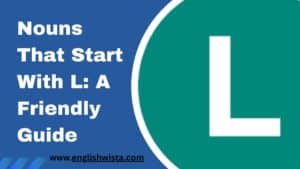Have you ever noticed how many fascinating words begin with the letter E? From everyday items like “egg” and “elephant” to complex concepts like “education” and “emotion,” the letter E opens the door to a treasure trove of nouns in English. Whether you’re a student building your vocabulary, a non-native speaker expanding your word knowledge, or simply someone curious about language, exploring nouns that start with E can be both fun and incredibly useful. Let’s embark on this exciting journey together and discover the wonderful world of E-nouns!
What Are Nouns That Start with E?
Simply put, nouns that start with E are naming words that begin with the letter E. These can be people, places, things, ideas, or concepts. Just like all nouns, they help us identify and talk about everything around us.
A noun is a word that names:
- A person (like “employee” or “emperor”)
- A place (like “England” or “elevator”)
- A thing (like “envelope” or “engine”)
- An idea or concept (like “equality” or “excitement”)
The beauty of E-nouns is their incredible variety. You’ll find simple, everyday words alongside complex, sophisticated terms. This makes them perfect for learners at any level.
Common Everyday E-Nouns
Let’s start with nouns you probably use every day. These are the building blocks of basic English conversation:
Around the House
- Egg – “I had scrambled eggs for breakfast.”
- Envelope – “Please put the letter in an envelope.”
- Eraser – “Can I borrow your eraser?”
- Electricity – “The electricity went out during the storm.”
- Engine – “The car engine needs repair.”
People and Relationships
- Employee – “She’s a hardworking employee.”
- Employer – “My employer offers good benefits.”
- Enemy – “They were enemies but became friends.”
- Expert – “He’s an expert in computer repair.”
- Elder – “The village elder gave wise advice.”
Places and Locations
- Earth – “Earth is our beautiful planet.”
- East – “The sun rises in the east.”
- Edge – “Be careful near the edge of the cliff.”
- Entrance – “The entrance is around the corner.”
- Exit – “Please use the emergency exit.”
These everyday E-nouns form the foundation of basic English communication. Practice using them in simple sentences to build your confidence.
E-Nouns for Emotions and Feelings
The letter E gives us many powerful words for describing how we feel. These emotion-related nouns are essential for expressing yourself clearly:
Positive Emotions
- Excitement – “The children couldn’t hide their excitement about the trip.”
- Enthusiasm – “Her enthusiasm for learning is contagious.”
- Enjoyment – “We got great enjoyment from the concert.”
- Elation – “His elation was obvious when he won the prize.”
- Euphoria – “The team felt euphoria after their victory.”
Challenging Emotions
- Embarrassment – “She felt embarrassment when she tripped.”
- Envy – “His envy of others made him unhappy.”
- Exhaustion – “After the marathon, exhaustion set in.”
- Emptiness – “The emptiness in his heart was overwhelming.”
- Eagerness – “Their eagerness to help was touching.”
Example sentences:
- “The excitement in the room was electric.”
- “She felt embarrassment but recovered quickly.”
- “His enthusiasm inspired everyone around him.”
Educational and Academic E-Nouns
Learning and education bring us many important E-nouns. These words are especially useful for students and anyone interested in knowledge:
Learning-Related Terms
- Education – “Education opens doors to opportunities.”
- Example – “Can you give me an example of that rule?”
- Exercise – “This grammar exercise is challenging.”
- Exam – “The final exam is next week.”
- Essay – “Write a short essay about your hometown.”
School and Study
- Eraser – “I need an eraser for this pencil.”
- Equipment – “The science lab has modern equipment.”
- Encyclopedia – “Look it up in the encyclopedia.”
- Element – “Oxygen is an important element.”
- Equation – “Solve this math equation.”
Example sentences:
- “Education is the key to success.”
- “This example makes the concept clear.”
- “The equipment in our lab is brand new.”
Nature and Environment E-Nouns
Nature provides us with beautiful E-nouns that describe our world:
Animals and Wildlife
- Elephant – “The elephant is the largest land mammal.”
- Eagle – “The eagle soared high above the mountains.”
- Eel – “We saw an electric eel at the aquarium.”
- Elk – “The elk grazed peacefully in the meadow.”
Natural Features
- Earth – “We must protect our Earth.”
- Earthquake – “The earthquake shook the entire city.”
- Echo – “Her voice created an echo in the canyon.”
- Erosion – “Water erosion carved these beautiful valleys.”
- Environment – “We need to protect our environment.”
Weather and Climate
- Evaporation – “Evaporation causes water to become vapor.”
- Eclipse – “The solar eclipse was spectacular.”
- Equator – “Countries near the equator are usually warm.”
Example sentences:
- “The elephant trumpeted loudly in the zoo.”
- “Protecting our environment is everyone’s responsibility.”
- “The echo bounced off the canyon walls.”
Food and Eating E-Nouns
Let’s explore E-nouns related to food and dining:
Foods We Eat
- Egg – “Eggs are a great source of protein.”
- Eggplant – “The eggplant curry was delicious.”
- Espresso – “I need an espresso to wake up.”
- Entree – “What’s your favorite entree at this restaurant?”
Eating and Cooking
- Eatery – “This small eatery serves amazing food.”
- Oven – Wait, that starts with O! Let me correct: Equipment – “Kitchen equipment makes cooking easier.”
Example sentences:
- “Fresh eggs make the best breakfast.”
- “This eatery is famous for its homemade pasta.”
- “The espresso here is perfectly brewed.”
Technology and Modern Life E-Nouns
Our modern world gives us many technology-related E-nouns:
Digital and Electronic Terms
- Email – “Please send me an email with the details.”
- Engine – “The search engine found millions of results.”
- Electronics – “Electronics have changed our daily lives.”
- Error – “There’s an error in this computer program.”
Communication and Media
- Entertainment – “Television provides hours of entertainment.”
- Episode – “Did you watch the latest episode?”
- Event – “The charity event raised thousands of dollars.”
Example sentences:
- “I check my email every morning.”
- “This entertainment system has amazing sound quality.”
- “The error message appeared on the screen.”
Abstract Concepts and Ideas
E-nouns aren’t just physical things. Many describe abstract concepts and ideas:
Important Concepts
- Equality – “Equality is a fundamental human right.”
- Ethics – “Medical ethics guide doctors’ decisions.”
- Evidence – “The detective collected evidence at the crime scene.”
- Experience – “Travel gives you valuable life experience.”
- Existence – “The existence of life on other planets fascinates scientists.”
Social and Cultural Terms
- Economy – “The country’s economy is growing stronger.”
- Election – “The election results surprised everyone.”
- Emergency – “Call 911 in case of an emergency.”
- Energy – “Renewable energy sources are becoming popular.”
Example sentences:
- “Equality should exist for all people.”
- “His experience helped him solve the problem.”
- “The economy affects everyone’s daily life.”
Professional and Work-Related E-Nouns
The workplace brings us many useful E-nouns:
Jobs and Careers
- Engineer – “The engineer designed the new bridge.”
- Editor – “The editor improved the article significantly.”
- Executive – “The executive made important business decisions.”
- Entrepreneur – “The young entrepreneur started three companies.”
Business Terms
- Enterprise – “Their small enterprise grew into a large company.”
- Estimate – “Can you give me an estimate for the repairs?”
- Expense – “Business expenses must be carefully tracked.”
- Efficiency – “New technology improved workplace efficiency.”
Example sentences:
- “The engineer explained the project clearly.”
- “She’s a successful entrepreneur with great ideas.”
- “Efficiency in the workplace saves time and money.”
Fun and Interesting E-Noun Facts
Here are some fascinating tidbits about E-nouns that might surprise you:
Word Origins
Many E-nouns come from other languages:
- Elephant comes from Greek, meaning “ivory”
- Energy comes from Greek, meaning “work” or “activity”
- Emotion comes from Latin, meaning “to move out”
Multiple Meanings
Some E-nouns have several different meanings:
- Engagement can mean a promise to marry, a battle, or involvement in an activity
- Element can mean a chemical substance, a part of something, or weather conditions
- Expression can mean a facial look, a mathematical formula, or a way of speaking
Collective Nouns
Some E-nouns describe groups:
- Ensemble – a group of musicians or actors
- Entourage – a group of people accompanying an important person
Common Mistakes with E-Nouns
Let’s look at some common errors people make with E-nouns and how to avoid them:
Spelling Challenges
- Exercise (not “excercise”) – “Daily exercise keeps you healthy.”
- Equipment (not “equiptment”) – “The gym has excellent equipment.”
- Environment (not “enviroment”) – “We must protect our environment.”
Pronunciation Tips
- Economy – stress on the second syllable: e-CON-o-my
- Envelope – can be pronounced EN-ve-lope or en-VEL-ope
- Executive – stress on the second syllable: ex-EC-u-tive
Usage Mistakes
Remember that some E-nouns are uncountable:
- Equipment (not “equipments”) – “The equipment is expensive.”
- Education (not “educations”) – “Education is important.”
Building Your E-Noun Vocabulary
Here are practical tips for learning and remembering more E-nouns:
Daily Practice Methods
- Word Association – Connect new E-nouns with things you already know
- Use in Sentences – Practice using each new word in your own sentences
- Visual Learning – Draw or find pictures that represent the nouns
- Story Creation – Make up short stories using multiple E-nouns
Memory Techniques
- Group by Theme – Learn emotion words together, then nature words
- Start Simple – Master common E-nouns before moving to complex ones
- Regular Review – Revisit words you’ve learned to keep them fresh
- Real-World Connection – Notice E-nouns in books, movies, and conversations
Practice Activities
Try these fun exercises:
- Make a list of 10 E-nouns you see in your home
- Write a paragraph using only sentences that contain E-nouns
- Play word games that focus on E-nouns
- Keep a vocabulary journal of new E-nouns you discover
E-Nouns in Different Contexts
Understanding how E-nouns work in various situations helps you use them correctly:
Formal Writing
In formal writing, use precise E-nouns:
- “The evidence supports this conclusion.”
- “Economic factors influenced the decision.”
- “Educational excellence requires dedicated effort.”
Casual Conversation
In everyday speech, simpler E-nouns work well:
- “That was an exciting game!”
- “I love your earrings.”
- “The elevator is broken again.”
Academic Settings
Academic writing often uses complex E-nouns:
- “The experiment yielded interesting results.”
- “Ethical considerations guide research methods.”
- “Environmental factors affect plant growth.”
Cultural and Regional Variations
E-nouns can vary slightly across different English-speaking regions:
American vs. British English
- Elevator (American) vs. Lift (British)
- Eggplant (American) vs. Aubergine (British)
Professional Jargon
Different fields use specialized E-nouns:
- Medicine: “Emergency,” “Examination,” “Epidemic”
- Technology: “Email,” “Encryption,” “Error”
- Business: “Enterprise,” “Equity,” “Expenditure”
Expanding Your E-Noun Knowledge
As you become more comfortable with basic E-nouns, you can explore more advanced vocabulary:
Advanced E-Nouns
- Eloquence – skillful use of language
- Equilibrium – a state of balance
- Epiphany – a sudden understanding
- Euphemism – a polite way of saying something unpleasant
- Euthanasia – the practice of ending life to relieve suffering
Specialized Fields
Different subjects contribute unique E-nouns:
- Science: “Ecosystem,” “Evolution,” “Enzyme”
- Art: “Easel,” “Etching,” “Exhibition”
- Music: “Echo,” “Ensemble,” “Encore”
Your E-Noun Journey Continues
Learning nouns that start with E is an ongoing adventure. These words appear everywhere in English – in books, movies, conversations, and daily life. The more you notice and use them, the more natural they’ll become.
Remember that building vocabulary takes time and practice. Don’t try to learn everything at once. Start with the common, everyday E-nouns and gradually add more complex terms as you feel comfortable.
Key takeaways for success:
- Practice regularly with words you encounter daily
- Use new E-nouns in your own sentences and conversations
- Don’t worry about making mistakes – they’re part of learning
- Connect new words to things you already know
- Have fun exploring the rich variety of E-nouns in English
Whether you’re writing an email, having a conversation, or reading a book, you’ll find E-nouns everywhere. They help us express emotions, describe our environment, discuss education, and navigate our modern world. From simple words like “egg” and “ear” to complex concepts like “equality” and “evolution,” E-nouns give us the tools to communicate clearly and effectively.
So keep exploring, keep practicing, and keep enjoying the wonderful world of English nouns that start with E. Your vocabulary will grow stronger with each new word you master, and soon you’ll be using these essential nouns with confidence and ease!



